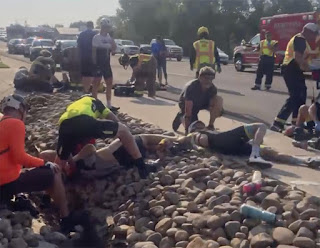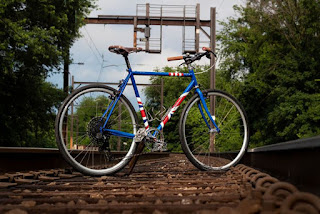Back in February, I wrote about Bicycle Meals and its founder, Mike Pak.
Last year, on a Monday, he put up a flyer on Instagram, calling for help in assembling and distributing packets to the un-housed of Koreatown, the Los Angeles community he calls home. The following Friday, 20 strangers rolled up to his apartment, ready to help.
 |
| Bicycle Meals volunteer getting ready to deliver. Photo by Angel Carreras, from KCRW. |
The volunteers included people of varied backgrounds, including graphic designers, audio producers and former chefs. Most were either working from home or not working at all, so they were able to contribute much time and energy--and, in many cases, their own money (to purchase food and other items). They assembled packets containing sandwiches, fruit, snacks, masks and hand sanitizer--in the apartments of Pak and Bicycle Meals co-founder Jacob Halpern.
They have since moved the assembly operation to the basement of a nearby church. Halpern notes that this has made the operation more efficient, but there is another problem: As pandemic restrictions loosen, many volunteers have returned to their old workplaces and schedules, which doesn't leave them as much time to be, well, volunteers.
The need for their services, however, has not decreased. Nor is the need for food and supplies. Local businesses supplied some of them, but much also came from the volunteers themselves. Some of the businesses can't donate as much as they did at first because they've lost so much revenue, and some of the volunteers are tapped out. So, Pak and Halpern are hoping to engage more of, and beyond, the community for help--not only with money and material resources, but also help in accessing social services and job placement.
It seems that with all of the changes, Pak and Halpern are still trying to deliver.
































